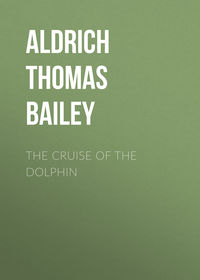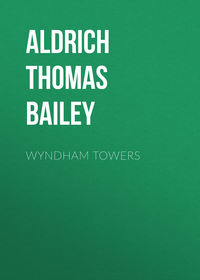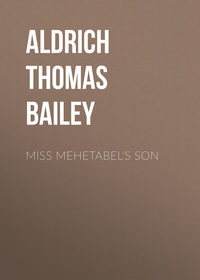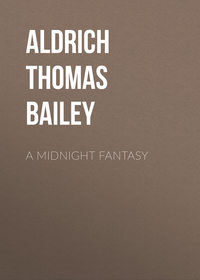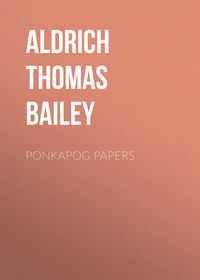 полная версия
полная версияThe Queen of Sheba, and My Cousin the Colonel
"The world doesn't come to an end that way—when one is twenty-six.
Does she like you, Ned?"
"How can I say? She does not dislike me. We have seen very much of each other. We have been together some portion of each day for more than a month. But I've never had her a moment alone; the aunt is always present. We are like old friends—with a difference."
"I see; the aunt makes the difference! No flirting allowed on the premises."
"Miss Denham is not a girl to flirt with; she is very self-possessed, with just a suspicion of haughtiness; personally, tall, slight, a sort of dusky Eastern beauty, with the clear warm colors of a New England September twilight—not like the brunettes on this side, who are apt to have thick complexions, saving their presence. I say she is not a girl to flirt with, and yet, with that sensitive-cut mouth and those deep eyes, she could do awful things in the way of tenderness if she had a mind to. She's a puzzle, with her dove's innocence and her serpent's wisdom. All women are problems. I suppose every married man of us goes down to his grave with his particular problem not quite solved."
Flemming gave a loud laugh. The "every married man of us" tickled him. "Yes," said he; "they are all daughters of the Sphinx, and past finding out. Is Miss Denham an invalid?" he asked, after a pause.
"No; she is not strong—delicate, rather; of the pure type of American young-womanhood—more spirit than physique; but not an invalid—unless"—
"You have let a morbid fancy run away with you, Ned. This lady and the other one are two different persons."
"If I could only believe it!" said Lynde. "I do believe it at times; then some gesture, some fleeting expression, a turn of the head, the timbre of her voice—and there she is again! The next moment I am ready to laugh at myself."
"Couldn't you question the aunt?"
"How could I?"
"You couldn't!"
"I have thought of that doctor at the asylum—what in the devil was his name? I might write to him; but I shrink from doing it. I have been brutal enough in other ways. I am ashamed to confess to what unforgivable expedients I have resorted to solve my uncertainty. Once we were speaking of Genoa, where the Denhams had spent a week; I turned the conversation on the church of St. Lorenzo and the relic in the treasury there—the Sacra Catino, a supposed gift to Solomon from the Queen of Sheba. Miss Denham listened with the calmest interest; she had not seen it the day she visited the church; she was sorry to have missed that. Then the aunt changed the subject, but whether by accident or design I was unable for the soul of me to conjecture. Good God, Flemming! could this girl have had some terrible, swift malady which touched her and passed, and still hangs over her—an hereditary doom?"
"Then she's the most artful actress that ever lived, I should say. The leading lady of the Theatre Francais might go and take lessons of her. But if that were so, Ned?"
"If that were so," said Lynde slowly, "a great pity would be added to my love."
"You would not marry her!"
Lynde made no reply.
The night had settled down upon Geneva while the friends were talking. The room was so dark they could not distinguish each other; but Flemming was conscious of a pale, set face turned towards him in the obscurity, in the same way that he was conscious of the forlorn whiteness of Mont Blanc looming up out yonder, unseen. It was dark in the chamber, but the streets were gay now with the life of a midsummer night. Interminable lines of lamps twinkled on the bridges and along the quays; the windows of the cafes on the opposite bank of the Rhone were brilliant with gas jets; boats, bearing merry cargoes to and from the lake, passed up and down the river; the street running under the hotel balcony was crowded with loungers, and a band was playing in the English Garden. From time to time a strain of music floated up to the window where the two men were sitting. Neither had spoken for some minutes, when Lynde asked his friend where he was staying.
"At the Schweizerhof," replied Flemming. "I always take the hotel nearest the station. Few Americans go there, I fancy. It is wonderfully and fearfully Swiss. I was strolling in here to look through the register for some American autographs when I ran against you."
"You had better bring your traps over here."
"It would not be worth while. I am booked for Paris to-morrow night.
Ned—come with me!"
"I can't, Flemming; I have agreed to go to Chamouni with the Denhams."
"Don't!"
"That is like advising a famishing man not to eat his last morsel of food. I have a presentiment it will all end there. I never had a presentiment before."
"I had a presentiment once," said Flemming impressively. "I had a presentiment that a certain number—it was number twenty-seven—would draw the prize in a certain lottery. I went to the office, and number twenty-seven was one of the two numbers unsold! I bought it as quick as lightning, I dreamed of number twenty-seven three successive nights, and the next day it drew a blank."
"That has the ring of the old Flemming!" cried Lynde, with an unforced laugh. "I am glad that I have not succeeded in turning all your joyous gold into lead. I'm not always such dull company as I have been to-night, with my moods and my presentiments. I owe them partly, perhaps, to not seeing Miss Denham to-day, the aunt having a headache."
"You were not in a rollicking humor when I picked you up."
"I had been cruising about town all the morning alone, making assaults on the Musee Fol, the Botanic Garden, and the Jewish Synagogue. In the afternoon I had wrecked myself on Rousseau's Island, where I sat on a bench staring at Pradier's poor statue of Jean Jacques until I fancied that the ugly bronze cannibal was making mouths at me. When the aunt has a headache, I suffer. Flemming, you must see Miss Denham, if only for a moment."
"Of course I should like to see her, Ned."
"You do not leave until evening," Lynde said, reflecting. "I think I can manage a little dinner for to-morrow. Now let us take a breath of fresh air. I know the queerest old nook, in the Rue de Chantpoulet, where the Bavarian beer is excellent and all the company smoke the most enormous porcelain pipes. Haven't I hit one of your weaknesses?"
"You have hit a brace!"
VII
THE DENHAMS
When Edward Lynde returned to the hotel that night, after parting with Flemming at the head of a crooked, gable-hung street leading to the Schweizerhof, the young man regretted that he had said anything on the subject of the Denhams, or rather, that he had spoken of the painful likeness which had haunted him so persistently. The friends had spent the gayest of evenings together at a small green-topped table in one corner of the smoky cafe. Over their beer and cheese they had chatted of old days at boarding-school and college, and this contact with the large, healthy nature of Flemming, which threw off depression as sunshine dissipates mist, had sent Lynde's vapors flying. Nothing was changed in the circumstances that had distressed him, yet some way a load had removed itself from his bosom. He was sorry he had mentioned that dark business at all. As he threaded the deserted streets—it was long after midnight—he planned a dinner to be given in his rooms the next day, and formulated a note of invitation to the ladies, which he would write when he got back to the hotel, and have in readiness for early delivery in the morning.
Lynde was in one of those lightsome moods which, in that varying month, had not unfrequently followed a day of doubt and restless despondency. As he turned into the Quai des Bergues he actually hummed a bar or two of opera. He had not done that before in six weeks. They had been weeks of inconceivable torment and pleasure to Lynde.
He had left home while still afflicted by David Lynde's death. Since the uncle's ill-advised marriage the intercourse between them, as the reader knows, had all but ceased; they had met only once, and then as if to bid each other farewell; but the ties had been very close, after all. In the weeks immediately following his guardian's death, the young man, occupied with settling the estate, of which he was one of the executors, scarcely realized his loss; but when he returned to Rivermouth a heavy sense of loneliness came over him. The crowded, happy firesides to which he was free seemed to reproach him for his lack of kinship; he stood alone in the world; there was no more reason why he should stay in one place than in another. His connection with the bank, unnecessary now from a money point of view, grew irksome; the quietude of the town oppressed him; he determined to cut adrift from all and go abroad. An educated American with no deeper sorrow than Lynde's cannot travel through Europe, for the first time at least, with indifference. Three months in Germany and France began in Lynde a cure which was completed by a winter in Southern Italy. He had regained his former elasticity of spirits and was taking life with a relish, when he went to Geneva; there he fell in with the Denhams in the manner he described to Flemming. An habitual shyness, and perhaps a doubt of Flemming's sympathetic capacity, had prevented Lynde from giving his friend more than an outline of the situation. In his statement Lynde had omitted several matters which may properly be set down here.
That first day at the table d'hote and the next day, when he was able more deliberately to study the young woman, Edward Lynde had made no question to himself as to her being the same person he had seen in so different and so pathetic surroundings. It was unmistakably the same. He had even had a vague apprehension she might recognize him, and had been greatly relieved to observe that there was no glimmer of recognition in the well-bred, careless glance which swept him once or twice. No, he had passed out of her memory—with the other shapes and shadows! How strange they should meet again, thousands of miles from New England; how strange that he alone, of all the crowded city, should know there had been a dark episode in this girl's history! What words she had spoken to him and forgotten, she who now sat there robed in the beauty of her reason!
It was a natural interest, and a deep interest, certainly, that impelled Lynde to seek the acquaintance of the two ladies. On the third day a chance service rendered the elder—she had left a glove or a handkerchief beside her plate at table, and Lynde had followed her with it from the dining-room—placed him upon speaking terms. They were his country-women, he was a gentleman, and the surface ice was easily broken. Three days afterwards Lynde found himself oddly doubting his first conviction. This was not that girl! The likeness was undeniable: the same purple-black hair, the same long eyelashes, a very distinctive feature. In voice and carriage, too, Miss Denham curiously recalled the other; and that mark on Miss Denham's cheek—a birth-mark—was singular enough. But there the analogies ended. Miss Denham was a young woman who obviously had seen much of the world; she possessed accomplishments which could have been acquired only by uninterrupted application; she spoke French, German, and Italian with unusual purity. That intellect, as strong and clear as crystal, could never have suffered even a temporary blur. He was beginning to be amazed at the blunder he had committed, when suddenly, one evening, a peculiar note in her voice, accompanied by a certain lifting of the eyelashes—a movement he had noticed for the first time, but which was familiar to him—threw Lynde into great perplexity. It WAS that other girl! How useless for him to try to blind himself to the truth! Besides, why should he wish to, and why should the fact of the identity trouble him to such a degree? The next day he was staggered by Miss Denham alluding incidentally to the circumstance that she and her aunt had passed a part of the spring of 1872 in Florida. That was the date of Lynde's adventure, the spring of 1872. Here was almost positive proof that Miss Denham could not have been in New England at the time. Lynde did not know what to think. Of course he was mistaken; he must be mistaken—and yet! There were moments when he could not look at Miss Denham without half expecting to see the man Blaisdell flitting somewhere in the background. Then there were days when it was impossible for Lynde to picture her as anything different from what she now was. But whatever conclusion he came to, a doubt directly insinuated itself.
While he was drifting from one uncertainty to another, a fortnight elapsed in which his intimacy with the Denhams had daily increased. They were in Geneva for an indefinite time, awaiting directions from Mr. Denham. The few sights in the city had been exhausted; the places of interest in the environs could not be visited by ladies without escort; so it fell out that Lynde accompanied the Denhams on several short excursions—to Petit and Grand Sacconnex, to the Villa Tronchin, to Pregny and Mornex. These were days which Lynde marked with a red letter. At the end of the month, however, he was in the same state of distressing indecision relative to Miss Denham. On one point he required no light—he was deeply interested in her, so deeply, indeed, that it had become a question affecting all his future, whether or not she was the person he had encountered on his horseback journey three years before. If she was—
But Edward Lynde had put the question out of his thought that night as he walked home from the cafe. His two bars of opera music lasted him to the hotel steps. Though it was late—a great bell somewhere, striking two, sent its rich reverberation across the lake while he was unlocking his chamber door—Lynde seated himself at a table and wrote his note to the Denhams.
Flemming had promised to come and take coffee with him early the next morning, that is to say at nine o'clock. Before Flemming arrived, Lynde's invitation had been despatched and accepted. He was re-reading Miss Denham's few lines of acceptance when he heard his friend, at the other end of the hall, approaching with great strides.
"The thousandth part of a minute late!" cried Flemming, throwing open the door. "There's no excuse for me. When a man lives in a city where they manufacture a hundred thousand watches a year—that's one watch and a quarter every five minutes day and night—it's a moral duty to be punctual. Ned, you look like a prize pink this morning."
"I have had such a sleep! Besides, I've just gone through the excitement of laying out the menu for our dinner. Good heavens, I forgot the flowers! We'll go and get them after breakfast. There's your coffee. Cream, old man? I am in a tremor over this dinner, you know. It is a maiden effort. By the way, Flemming, I wish you'd forget what I said about Miss Denham, last evening. I was all wrong."
"I told you so; what has happened?"
"Nothing. Only I have reconsidered the matter, and I see I was wrong to let it upset me."
"I saw that from the first."
"Some persons," said Lynde gayly, "always see everything from the first. You belong to the I-told-you-so family, only you belong to the cheerful branch."
"Thank the Lord for that! A wide-spreading, hopeful disposition is your only true umbrella in this vale of tears."
"I shall have to borrow yours, then, if it rains heavily, for I've none of my own."
"Take it, my boy; my name's on the handle!"
On finishing their coffee the young men lighted cigars and sallied forth for a stroll along the bank of the river, which they followed to the confluence of the Rhone with the Arve, stopping on the way to leave an order at a florist's. Returning to the hotel some time after mid-day, they found the flowers awaiting them in Lynde's parlor, where a servant was already laying the cloth. There were bouquets for the ladies' plates, an imposing centre-piece in the shape of a pyramid, and a profusion of loose flowers.
"What shall we do with these?" asked Lynde, pointing to the latter.
"Set 'em around somewhere," said Flemming, with cheerful vagueness.
Lynde disposed the flowers around the room to the best of his judgment; he hung some among the glass pendants of the chandelier, gave a nosegay to each of the two gilt statuettes in the corners, and piled the remainder about the base of a monumental clock on the mantelpiece.
"That's rather a pretty idea, isn't it?—wreathing Time in flowers," remarked Flemming, with honest envy of his friend's profounder depth of poetic sentiment.
"I thought it rather neat," said Lynde, who had not thought of it at all.
In the course of that dinner if two or three unexplained demure smiles flitted over Miss Denham's face, they might, perhaps, have been indirectly traced to these floral decorations, though they pleased her more than if a woman's hand had been visible in them.
"Flemming," said Lynde, with a severe aesthetic air, "I don't think that arrangement in the fireplace is quite up to the rest of the room."
"Nor I either," said Flemming, who had been silently admiring it for the last ten minutes.
The fireplace in question was stuffed with a quantity of long, delicately spiral shavings, sprinkled with silver spangles or flakes of isinglass, and covered by a piece of pale blue illusion. This device—peculiarly Genevese—was supposed to represent a waterfall.
"Take a match and touch it off," suggested Flemming.
"If we had some more flowers, now"—"Exactly. I am going to the hotel to get myself up like a head-waiter, and I'll bring some when I come back."
In an hour afterwards Flemming reappeared, followed by a youth bearing an immense basket. Lynde removed the Alpine waterfall to an adjoining chamber, and built up a huge fire of flame-colored flowers in the grate. The two friends were standing in the middle of the room, gravely contemplating the effect, when a servant opened the door and announced Mrs. and Miss Denham. A rustle of drapery at the threshold was followed by the entrance of the two ladies in ceremonious dinner toilets.
Lynde had never seen Miss Denham in any but a dark travelling-dress, or in such unobtrusive costume as a modest girl may wear at a hotel table. He stood motionless an instant, seeing her in a trailing robe of some fleecy, maize-colored material, with a cluster of moss-roses at her corsage and a cross of diamonds at her throat. She was without other ornament. The shade of her dress made her hair and eyes and complexion wonderful. Lynde was proud to have her look like that for Flemming, though he was himself affected by a queer impression that this queenly young person was not the simple, lovely girl he had known all along. He was embarrassed by her unexpected elegance, but he covered his embarrassment and his pleasure by presenting his friend to the ladies, and ordering the servant to serve the dinner immediately.
Lynde's constraint was only momentary, and the others had experienced none. Flemming, indeed, had a fleeting surprise at finding in the aunt a woman of thirty-five or thirty-eight, in the Indian summer of her beauty. Lynde had given him the idea of an elderly person with spectacles. As to Miss Denham, she had not fallen short of the mental picture Flemming had drawn of her—which ought to have surprised him. No charms or graces in a woman, however, could much surprise Flemming; he accepted them as matters of course; to him all women were charming in various degrees. He had that general susceptibility which preserves us the breed of bachelors. The constant victim of a series of minor emotions, he was safe from any major passion. There was a certain chivalrous air of camaraderie in his manner to women which made them like him sooner or later; the Denhams liked him instantly. Even before the potage was removed, Lynde saw that his dinner was a success. "The cook may drop dead now, if he wants to," said Lynde to himself; "he can't spoil anything."
"You are not entirely a stranger to us, Mr. Flemming," said Mrs. Denham, looking at him from behind the floral pyramid, which had the happy effect of isolating two guests who sat opposite each other. "There is a person who goes about foreign lands with no other ostensible mission than to sound your praise."
"You must set down a great deal to filial gratitude," returned
Flemming. "I have been almost a father to our young friend."
"He tells me that your being here is quite accidental."
"It was one of those fortunate things, madam, which sometimes befall undeserving persons, as if to refute the theory of a special providence."
"On the contrary, Mr. Flemming"—it was Miss Ruth who spoke—"it was evidently arranged with the clearest foresight; for if you had been a day later, perhaps you would not have found your friend in Geneva—that is, if Mr. Lynde goes with us to Chamouni."
"You have heard from Mr. Denham, then?" said Lynde, turning to the aunt.
"We had letters this morning. Mr. Denham is in Paris, where he will remain a week or ten days, to show the sights to an old American friend of ours who is to join our party. I think I told you, Mr. Lynde? Supposing us to be weary of Geneva by this time, Mr. Denham suggests that we go on to Chamouni and wait there. I have left the matter to Ruth, and she decides in favor of leaving to-morrow, if the weather is fine."
"We are not tired of Geneva," said Miss Denham; "it would be ingratitude to Mr. Lynde to admit that; but we are longing for a nearer view of the Mont Blanc groups. One ought to know them pretty well after six weeks' constant looking at them; but the changes in the atmosphere make any certain intimacy impossible at this distance. New ranges loom up and disappear, the lines alter almost every hour. Were you ever at the Isles of Shoals, Mr. Flemming?"
Flemming started slightly. Since Miss Denham entered the room, he had given scarcely a thought to Lynde's dismal suspicions. Once or twice they had come into Flemming's mind, but he had promptly dismissed them. The girl's inquiry concerning a locality in New Hampshire suddenly recalled them, and recalled the motive with which Lynde had planned the dinner. Flemming flushed with vexation to think he had lent himself to the arrangement.
"I have spent parts of two summers at the Isles of Shoals," he said.
"Then you must have observed the singular changes that seem to take place on the mainland, seen from Appledore. The mirage on the Rye and Newcastle coasts—is it Newcastle?—sometimes does wonderful things. Frequently you see great cities stretching along the beach, some of the houses rising out of the water, as in Venice, only they are gloomy, foggy cities, like London, and not like Venice. Another time you see ships sailing by upside down; then it is a chain of hills, with peaks and projections that melt away under your eyes, leaving only the flat coast-line."
Flemming had seen all this, and seemed again to see it through the clear medium of the young girl's words. He had witnessed similar optical illusions in the deserts, also, which he described to her. Then he remembered a curious trick of refracted light he had once seen in the sunrise on Mount Washington, and suddenly he found himself asking Miss Denham if she were acquainted with the interior of New Hampshire. Flemming had put the interrogation without a shadow of design; he could have bitten his tongue off an instant after.
Lynde, who had been discussing with Mrs. Denham the details of the next day's journey, looked up quickly and sent Flemming a rapid scowl.
"I have never been inland," was Miss Denham's answer. "My acquaintance with New Hampshire is limited to the Shoals and the beaches at Rye and Hampton. In visiting the Alps first I have, I know, been very impolite to the mountains and hills of my own land."
"Ruth, dear, Mr. Lynde and I have been speaking of the conveyance for to-morrow; shall it be an open or a close carriage?"
"An open carriage, by all means, aunt."
"That would have its inconvenience in case of showers," said Lynde; "when April takes her departure from the Alps, she is said to leave all her capriciousness behind her. I suggest a partially closed vehicle; you will find a covering comfortable in either rain or shine."
"Mr. Lynde thinks of everything," remarked Mrs. Denham. "He should not allow himself to be dictated to by unforeseeing woman."
"In strict confidence, Mrs. Denham, I will confess that I have arbitrarily taken this business in hand. For nearly a week, now, I have had my eye on a vehicle that must have been built expressly for us; it is driven by a tall, distinguished person, frosty of mustache and affable of manner—evidently a French marquis in disguise."


